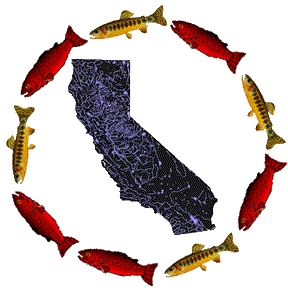|
CSPA |
| Your 501(c)(3) tax deductible cash donations are desperately needed if the fight for our fisheries is to continue. Read how you can donate! |

 More
News
More
News
![]()
 Stakeholders
urge NMFS to take necessary steps to restore salmon fishery
Stakeholders
urge NMFS to take necessary steps to restore salmon fishery
By Dick Pool, Water4Fish
September 30, 2008 -- Mr. Rod McInnis, Southwest Regional Director of
The National Marine Fisheries Service, hosted a stakeholders meeting at
the NMFS Sacramento office on September 18th. He was joined by Mr.
Russ Strach, Assistant Administrator for Protected Resources, Ms. Maria
Rea, Sacramento Area Office Supervisor, and Mr. Churchill Grimes,
Director of the Santa Cruz Fisheries Ecology Division. Mr. Neil
Manji, Director of Fisheries for the Calif. Dept of Fish and Game, sat
in on the meeting. Stakeholder participants included commercial
and recreational fishermen, fishery conservation groups and fishing
businesses. In total, the stakeholders present represented over
250,000 fishermen and supporters, and over 1,000 businesses with a
California economic contribution of over $1 billion. The
stakeholder participants are listed at the end of this report.
The purpose of the meeting was to discuss:
1. The salmon crisis in California
2. The salmon steelhead recovery plan under
development by NMFS
3. The biological opinions under development by
NMFS
4. A review of the NRDC salmon recovery
proposal “Fish Out of Water”.
Bill Jennings opened the meeting explaining the concerns of the
stakeholders and the questions they would like answered. He spoke
of the severe crisis of the Central Valley salmon runs and the current
lack of any meaningful recovery steps. He was very critical of the
past NMFS biological opinions which he charged have totally failed to
protect endangered salmon and steelhead. He indicated that NMFS is
the only agency that has the lawful authority and legal responsibility
to protect these fish and the agency has completely failed to exercise
this responsibility. Jennings urged a major change in how the
agency exercises its authority by putting fish needs first. He
asked the agency to please tell the group what they are going to do to
correct the ills of the past and when. He indicated that unless
NMFS changes its permit process, most observers believe that within five
years the runs will be beyond recovery. He also expressed deep
concern that the peripheral canal is not receiving any analysis of its
impact on salmonids particularly the upstream impact on flows and
habitat with additional water diversions.
Rod McInnis discussed the role that NMFS has in marine fishery
management. Their strongest authority comes from the Endangered
Species Act. They have the full authority of that law to set the
operating parameters and design criteria for all projects with a Federal
nexus (funding, permits, etc.) that interact with endangered fish or
their designated critical habitat. NMFS has no direct regulatory
authority over non-ESA listed fall-run Chinook in the Central Valley.
Other applicable authorities include the Fish Wildlife
Coordination Act and the Essential Fish Habitat provisions of the
Magnuson Stevens Fishery Management and Conservation Act. Neither
authority, however, enables NMFS to establish mandatory actions. McInnis
also outlined NMFS responsibilities under the Federal Power Act and he
described NMFS authorities to prescribe fish ways when the science
supports such a finding.
McInnis indicated that under the Endangered Species Act, NMFS has the
responsibility to produce recovery plans for salmon and steelhead but
they do not have the authority to dictate implementation of the recovery
projects. He also indicated NMFS has some limited authority to
deal with polluted waters.
Maria Rea presented the analysis and steps that are underway to produce
the Central Valley Multi-species salmon recovery plan. She showed
samples of how each watershed has been analyzed for stressors on salmon.
NMFS is now in the process of identifying actions that will remove
those stressors. She indicated the draft plan will be ready in
November for public review and the final plan completed in 2009.
A number of stakeholders expressed deep concern about the nature of the
plan. It was labeled as only “a list of opportunities” without
priorities, implementation timing and funding needs. Several
individuals indicated they believe recovery is impossible with this
approach. The strongest criticism came in the lack of meaningful
elements dealing with the delta and the pump driven water management as
it affects fish. It was stated that without fixing the delta, many
upper river projects are useless because even if they produce more
smolts, under current conditions the fish will be lost in the delta.
McInnis indicated he understood the concern and that NMFS would try to
help, but it did not have the authority to prepare and execute the full
plan the stakeholders outlined. He indicted he would discuss the
subject with the other fishery agencies.
Churchill Grimes discussed the joint agency task force that is trying to
answer the 54 questions provided by the PFMC. He indicated that
they do not have answers yet on a number of the questions particularly
how the fall run can be recovered.
Increased trucking of hatchery fish and expanded hatchery operations
were discussed. Stakeholders have been pushing for more trucking
and more hatchery fish as the best means of bringing back a fishing
season as soon as possible. NMFS indicated they understood the
need of the fishing industry but they are concerned about the straying
of hatchery fish to watersheds where unique gene pools currently exist.
They are concerned that interbreeding with hatchery fish has
resulted in the loss of unique runs to these watersheds, and thereby
reduced the species diversity and resiliency that has safeguarded these
runs against adverse effects that lead to wide spread population
collapses. Hence, they are not in favor of increased hatchery
production and they feel some curtailment in trucking may be necessary.
The stakeholders indicated they would like to talk more about this
subject.
McInnis discussed the new biological opinion that NMFS has underway as a
result of the Federal District court ruling on the 2004 Central Valley
and State Water Project. He indicated the draft opinion would be
posted on NMFS Regional website in December and the final opinion is
scheduled to be released on March 2, 2009 in accordance with the
District Court Order.
Doug Obegi presented the NRDC “Fish out of Water” salmon recovery
proposal. The study is based on the premise that salmon can never
be recovered with business as usual in the delta. The study shows
how current delta operations and the water movements and habitat
conditions that result in the upper rivers will not allow salmon
recovery. The study recommends that the salmon population doubling
goals that are currently included in both state and federal laws be
implemented. It proposes a number of action steps that, if
implemented, will bring about recovery. The study also shows how
the future needs of fish, agriculture and municipalities can all be met
with improved conservation, recycling and groundwater management.
Rod McInnis indicated he would like more information about the
authorities that the stakeholders believe that NMFS has to achieve the
doubling requirements for salmon. This information will be
forwarded to him.
In summary the stakeholders requested several actions on the part of
NMFS
1. Adopt the doubling goals and lay plans to
achieve them. In salmon production terms, doubling means laying
plans that will allow 15 to 20 million pounds of commercial catch along
with a parallel recreational catch.
2. Change their current recovery list to a full
plan with priorities and steps along with a financing proposal that the
stakeholders can support.
3. Focus more on the real causes of the
decline. Set plans that will reduce the amount of water taken out
of the delta and reduce its pollution.
4. Improve enforcement of illegal water
movements and diversions.
5. Stop focusing on compromises and bring the
agency’s full focus on the needs of fish. Use the unique
position of the agency and its bully pulpit ability to get positive
results for fish.
In closing, Mr. McInnis thanked the stakeholders for their comments and
insight and suggested a possible next meeting after the agency finishes
its public review draft recovery plan in December 2008.
In the windup, several stakeholders commented on the outstanding NMFS
staff. We feel let down on a number of issues but we highly
respect the expertise and dedication of the Southwest Regional staff.
We sincerely appreciate all of their efforts on behalf of the
resource.
Following is a list of the stakeholders in attendance:
American Sportfishing Assoc. - thingy Pool, Ken Elie, Brian Layng
Cal Trout – Jeff Shellito
California Sportfishing Protection Alliance – Bill Jennings
California Striped Bass Assoc. - Gary Adams, Roger Mammon
California Water Impact Network - Mike Jackson
Coastside Fishing Club – Paul Pierce
Earth Justice – John Mc Manus
Golden Gate Fishermen’s Assn. – Roger Thomas
Half Moon Bay Fishermen’s Assn. – Duncan Mac Lean
International Sportsmen’s Expositions - Brian Layng
Outdoor Pro Shop – Ken Elie
Monterey Fishermen’s Assn. – Mike Rickets
Natural Resources Defense Council – Doug Obegi
PCFFA - Zeke Grader
Pro-Troll – thingy Pool
Restore the Delta – Barbara Barrigan Parilla, Roger Mammon
Sacramento River Guides – Mark Milcoch
Salmon Aid – Mike Hudson
Salmon Stamp Committee – Mike Rickets
Sherman Island Duck Hunters – Roger Mammon
Small Boat Commercial Salmon Fishermen’s Assn. – Mike Hudson
The Fish Sniffer - Dan Bacher
Water4Fish – thingy Pool, Gary Adams
The following stakeholders support the activity but could not attend the
meeting
Allied Fishing Group – Mike Mc Kenzie
American Sportfishing Assoc. - Gordon Robertson
Coastside Fishing Club – Chris Hall, Dan Wolford
Cal Trout – Brian Stranko
California Sportfishing Protection Alliance – John Beuttler
California Sportsman Radio – Sep Hendrickson
Environmental Defense Fund – Laura Harnish
Environmental Water Caucus – David Nesmith
Federation of Fly Fishers – Mark Rockwell
Friends of the River – Kelly Catlett
Hi’s Tackle Box – Jonah Li
Icon Products – John Ryzanych
KFBK Radio Outdoorsman – Bob Simms
PCFFA – Vivian Helliwell, Dave Bitts
Tackle Technology – John Bedwell
Trout Unlimited – Chuck Bonham
USA Fishing – Mike Aughney
Water4Fish – Bob Mellinger, Michael Schweit